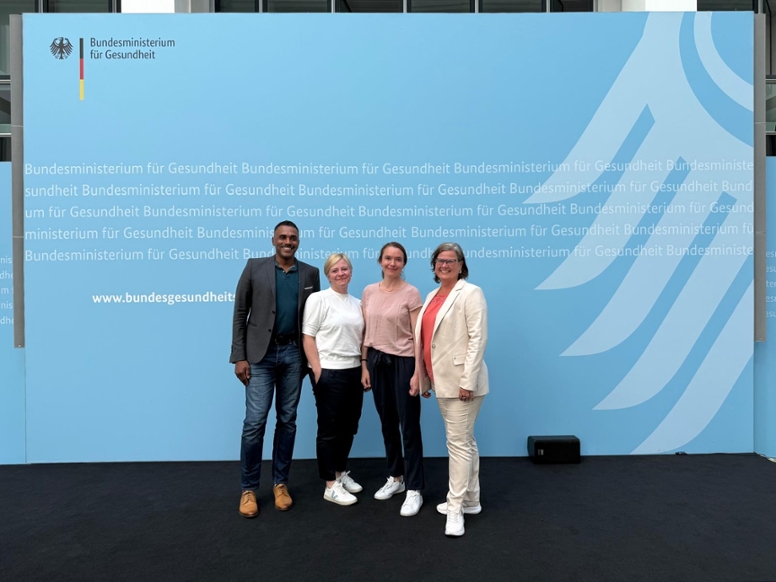FUTURE International UKR – Telemedicine to Strengthen the Ukrainian Health System
Telemedicine support to address the current crisis and build further intensive care capacity and web-based learning modules
Date: 15/05/2025
Since the summer of 2022, the Robert Koch Institute (RKI) and Charité – Universitätsmedizin Berlin, in collaboration with the Ukrainian Ministry of Health, have been working to strengthen healthcare delivery in Ukraine through telemedicine solutions. The FUTURE International UKR project was commissioned by the German Federal Ministry of Health (BMG) and funded under the Global Health Protection Programme (GHPP). The project period concluded in December 2024.

Former Federal Minister of Health Karl Lauterbach visits Charité and a Ukrainian hospital during a telemedicine visit.
Duration: 01.08.2022 – 31.12.2024
Partner country: Ukraine
Partner institutions:
- Ukrainian Ministry of Health
- Charité - Universitätsmedizin Berlin
- Robert Koch Institute
Telemedical Infrastructure Under Crisis Conditions
The goal of the project was to establish a robust telemedicine network under the challenging conditions of an ongoing war—focusing in particular on the intensive care of patients with severe and complex injuries. In close coordination with the Ukrainian Ministry of Health, key hospitals were equipped with a total of 22 telepresence systems: 12 of these were funded through the GHPP, while an additional 10 were provided via the GIZ-funded project SOLOMIYA.
Over 600 Telemedical Consultations
During the course of the project, more than 600 telemedical case consultations were conducted. Ukrainian physicians were able to draw on specialized expertise in intensive care, infectious diseases, pediatrics, and trauma care—delivered directly to the bedside. Through the complementary SOLOMIYA project network, further disciplines such as rehabilitation and reconstructive surgery were integrated.
Sustainable Knowledge Transfer Through E-Learning
A key component of the project was the development of a modular e-learning program. The content covered intensive care and trauma-related topics, including sedation, delirium management, and antimicrobial strategies. The video-based materials were developed in close collaboration with the National Health Service Ukraine (NHSU) and are being integrated into Ukraine’s national continuing education system—available to both students and healthcare professionals.
Sustainability Beyond the Project Term

Telemedicine Team at the German Federal Ministry of Health in Berlin (from left to right): Dr. Daniel Hechler (RKI), Dr. Karin Steinecke (Charité), Dr. Katharina Lang (RKI), Michaela Niebank (RKI)
The telemedicine systems remain in Ukraine, and the e-learning content will continue to be accessible in the long term. The Ukrainian Ministry of Health has expressed strong interest in continuing the telemedical collaboration. Project partners remain in close contact and are jointly exploring opportunities to deepen the partnership.
The combination of digital connectivity, medical expertise, and sustainable training has proven to be an effective tool in international crisis response. The FUTURE International UKR project exemplifies international health cooperation based on mutual respect—even under the most difficult circumstances.
